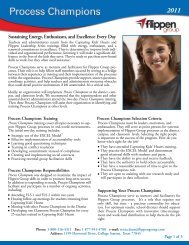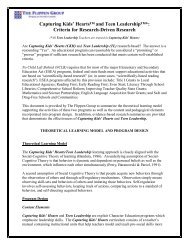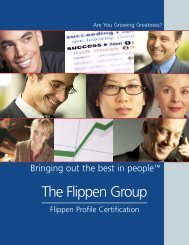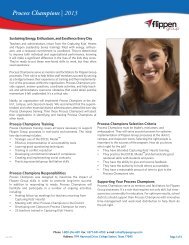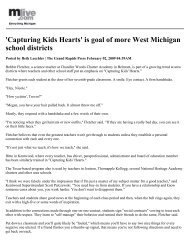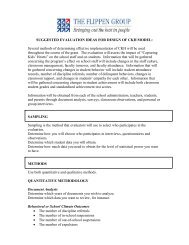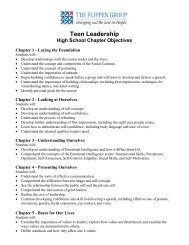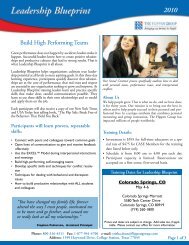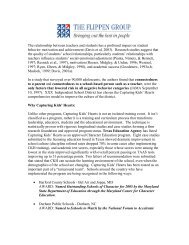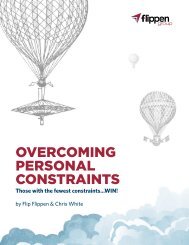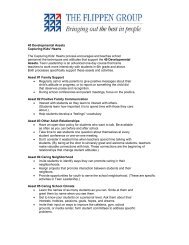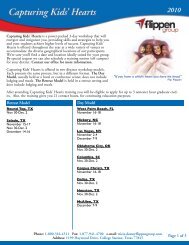Smart & Good High Schools - The Flippen Group
Smart & Good High Schools - The Flippen Group
Smart & Good High Schools - The Flippen Group
- No tags were found...
Create successful ePaper yourself
Turn your PDF publications into a flip-book with our unique Google optimized e-Paper software.
CHAPTER 5: Fostering the 8 Strengths of Character—Outcome 4ly will develop, the children will develop, they’ll live a happylife.Cabell Brand’s steadfast efforts to improve the lot of thepoor and working poor could be the springboard for discussingthe strengths and shortcomings of our nation’seconomic system and what each of us can do to promotegreater economic justice. As part of that inquiry, studentscould be asked to interview government officials, politicalrepresentatives, and scholars who have studied the problemof poverty and other economic issues. Issues toprobe: Why so many poor people in the wealthiest nationon earth? Why, as recent scholarship has documented, isthere a growing gap between the rich and the poor? 19Concerning these issues, how does our country compareinternationally?“<strong>The</strong> weakness in our capitalisticdemocratic system is the numberof people who don’t participate.”Draw Lives of Character from Current EventsCurrent events are an ongoing source of lives of character.Students can be asked to read the newspaper, forexample, to find persons who have put their ethical principlesinto practice. Over the course of the year, the classcan develop a bulletin board displaying many such personsof character.One example: In 2003, the Nobel Prize for Peace wasawarded to Shirin Ebadi, the first Muslim woman to bechosen and the first person from Iran to win this award.Her story (see box, page 136), used as the basis of a lessonon human dignity and courage by Civics in Action(www.civicsinaction.org; see also page 86), is a compellingportrait of a principled ethical thinker who acts on herethical convictions without counting the cost.Shirin Ebadi’s principled stand for universal humanrights, like Cabell Brand’s personal war against poverty,provides a model of social activism springing from thehighest levels of ethical thinking. <strong>The</strong>re are many suchcontemporary examples from which young people candraw inspiration, including South Africa’s Nelson Mandela,Poland’s Lech Walesa, and the late Pope John PaulII. In such lives, there is a deep sense of social justice thatvalues the life and dignity of every person without exception—andthat challenges societal structures, includingunjust laws, that do not support full human dignity andjustice for all.Research on moral reasoning finds that currently, mostpeople in any given society do not attain this high level offully universalized respect for human rights—which helpsto explain why many people easily fall into the mistreatmentof out-groups or indifference toward suchinjustices. 20 But with more diligent efforts by schools todevelop ethical thinking, there is reason to hope that ahigher percentage of citizens will achieve a principledlevel of respect for the rights of all human beings.With more diligent efforts by schools,a higher percentage of persons maydevelop a principled respect forhuman rights.Students combing current events for examples of charactershould also be encouraged to find lives of quietvirtue—ones that they can readily emulate in their everydaylives. Ryan and Bohlin cite the example of OsceolaMcCarty. In 1995, someone at the University of SouthernMississippi revealed that McCarty had given the Universityher life savings of $150,000 to establish a scholarship fundfor needy African-American students. A recently retiredlaundress, McCarty had saved nickels and dimes from alifetime of washing and drying clothes. She left schoolwhen she was in the 6th-grade to care for a sick aunt andsoon became a full-time helper in the family laundry business.Ryan and Bohlin write:Her world was her three tubs, her scrub board, and herBible. Never having had children of her own, and now crippledwith arthritis, Osceola decided to let the young “havethe chance I didn’t have.” Her gift has inspired many othersto perform acts of generosity, but it has confused some. Sheis regularly asked, “Why didn’t you spend the money onyourself?” She answers simply, “I am spending it onmyself.” 21Students contemplating the generosity of OsceolaMcCarthy might be asked to journal: How, in my life, do Ipractice the virtue of generosity? How, and with whom, might Ibe more generous?Use Movies to Examine Lives of CharacterWhen he was a professor of psychology at New York University,Paul Vitz carried out a study that asked, “Canmovies be used to promote the virtue of altruism amongyoung adolescents?” 22Vitz showed three classes of New York City students 30-135<strong>Smart</strong> & <strong>Good</strong> <strong>High</strong> <strong>Schools</strong>



